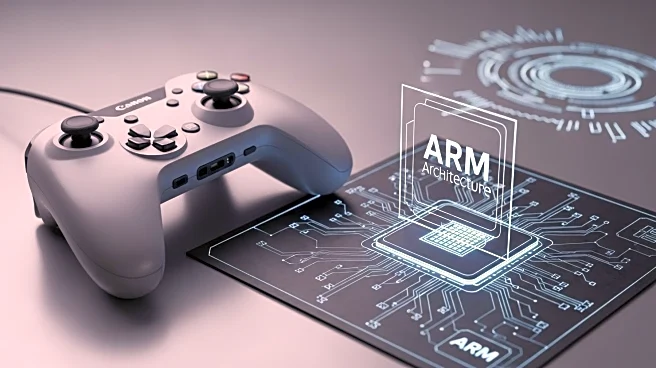What's Happening?
Qualcomm is facing challenges in optimizing its Snapdragon X2 Elite Extreme chip for PC gaming due to its ARM architecture, which differs from the x86 architecture used by Intel and AMD. Despite efforts to enhance gaming capabilities, Qualcomm's chips encounter compatibility issues with many modern AAA titles. The company has managed to optimize 1,400 games for Snapdragon, but the list of compatible modern games remains limited. Qualcomm's chief of mobile and compute, Alex Katouzian, acknowledged the slow progress in gaming optimization, citing anti-cheat compatibility issues as a significant hurdle. Qualcomm is working to entice developers to port games to ARM, but current solutions rely heavily on Microsoft's Prism emulator, which can lead to performance issues. The company aims to position its devices for casual gaming rather than as full-fledged gaming platforms.
Why It's Important?
The struggle to optimize ARM-based chips for PC gaming has broader implications for Qualcomm's position in the competitive chip market. As gaming continues to be a major driver of consumer technology, Qualcomm's inability to fully support popular games could limit its appeal to gamers and impact its market share against competitors like Intel and AMD. The reliance on emulation for game compatibility may deter developers and consumers seeking seamless gaming experiences. Qualcomm's efforts to improve gaming performance are crucial for maintaining relevance in the PC market, especially as gaming hardware evolves. The company's collaboration with major tech partners like Google and Microsoft highlights its strategic focus on expanding ARM's presence in gaming, but the slow progress may affect its long-term competitiveness.
What's Next?
Qualcomm plans to release devices with the Snapdragon X2 Elite chip by early next year, potentially around CES 2026. The company is working with gaming hardware makers on future projects, although details remain undisclosed. Qualcomm's focus on enhancing GPU performance and power efficiency will continue as it seeks to compete with Intel and AMD. The upcoming release of new chips from these competitors will provide a benchmark for Qualcomm's advancements. Additionally, rumors suggest Valve may port games to ARM for a standalone VR headset, which could benefit Qualcomm if realized. The company's ongoing efforts to improve game compatibility and performance will be critical in shaping its future in the gaming industry.
Beyond the Headlines
Qualcomm's challenges with PC gaming compatibility reflect broader industry trends in adapting ARM architecture for diverse applications. The company's focus on mobile gaming, where ARM is dominant, contrasts with its struggles in the PC gaming sector. Qualcomm's chips are popular in mobile devices, but the transition to PC gaming requires overcoming significant technical barriers. The company's collaboration with tech giants and gaming hardware makers indicates a strategic push to expand ARM's role in gaming. However, the reliance on emulation and limited game compatibility highlight the complexities of this transition. Qualcomm's efforts may influence future developments in gaming technology and chip architecture.










